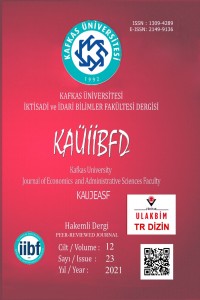TÜRKİYE’YE GELEN DOĞRUDAN YABANCI SERMAYE YATIRIMLARININ BORSA SANAYİ ENDEKSİ ÜZERİNE ETKİLERİ
Abstract
Bir ekonominin ana gücünü sanayi sektörü oluşturmaktadır. Bu boyutuyla sanayi sektörüne gelen doğrudan yabancı sermaye yatırımlarının büyüme ve istihdama katkıları ve buna bağlı olarak borsa endeksine etkilerinin de pozitif yönde olması beklenmektedir. Bu çalışmada Türkiye’ye gelen doğrudan yabancı sermaye yatırımlarının borsanın sanayi endeksi üzerine etkileri 2005:01-2020:02 arası dönem için ARDL analizleri ile inceleme konusu yapılmıştır. Analiz sonuçlarında göre, Türkiye’ye gelen doğrudan yabancı sermaye yatırımlarının aynı zamanda borsa sanayi endeksi için de doğrusallık ilişkileri yarattığı görülmüş ve bunun da ancak uzun dönemli boyutta etkili olduğu gözükmüştür. Bu çerçevede Türkiye ekonomisinin politik ve ekonomik açıdan istikrar ve güven verdikçe hem yatırımları doğrudan hem de dolaylı bir şekilde yabancı sermaye çekebileceği söylenebilir. Böylece uzun vadeli yabancı sermaye için uygun iklim yaratılmasının sadece borsa özelinde coşku yaratmakla kalmayıp, ülkenin gereksinim duyduğu tasarruf ve döviz açığı sorununu da çözeceği açıktır.
References
- Acheampong, Isaac K. and Emmanuel A.Wiafe (2013). Foreign Direct Investment and Stock Market Development: Evidence From Ghana”, International Journal of Finance and Policy Analysis, 5 (1): 3-15.
- Adam, M. Anokye and George Tweneboah (2009). “Foreign Direct Investment and Stock Market Development: Ghana's Evidence”, International Research Journal of Finance and Economics, 26: 178-185.
- Arčabić, Vladimir, Tomislav Globan and Irena Raguž Krištić (2013). The Relationship between the Stock Market and Foreign Direct İnvestment in Croatia: Evidence from VAR and Cointegration Analysis, Financial Theory and Practice, 31 (1): 109-126.
- Baker, Malcolm, C. Fritz Foley and Jeffrey Wurgler (2004). The Stock Market and Investment: Evidence from FDI Flows”, NBER Working Paper Series, Working Paper 10559.
- Boydaş, Yunus ve Müslim Polat (2018). Doğrudan Yabancı Sermaye Yatırımlarının Borsa İstanbul’a Etkisinin Belirlenmesi, Bingöl Üniversitesi İktisadi ve İdari Bilimler Fakültesi Dergisi, 2 (2): 37-40.
- Choe, Hyuk, Bong-Chan Kho and René M. Stulz (1999). Do Foreign Investors Destabilize Stock Markets? The Korean Experience in 1997, Journal of Financial Economics, 54 (2): 227-264.
- Gujarati, Damodar N. (2003). Temel Ekonometri, (Çev: Ü. Şenesen ve G. G. Şenesen), Literatür Yayıncılık, İstanbul.
- Kunal, Kunal and B. V. Phani (2017), “FDI Inflow, Stock Market Performance and Exchange Rate: Indian Scenario”, International Journal of Accounting and Financial Reporting, 7 (2): 148-171.
- Malik, A.I. and Amjad, S. (2013). Foreign direct investment and stock market development in Pakistan, Journal of International Trade, Law and Policy, 12(3), 226-242.
- Pesaran, M. Hashem, Shin, Yongcheol and Smith, Richard J. (2001). Bounds Testing Approaches to the Analysis of Level Relationships, Journal of Applied Econometrics, 16: 289-326.
- Raza, Ali, Nasir Iqbal, Zeshan Ahmed, Mohammad Ahmed and Tanvir Ahmed (2012). The Role of FDI on Stock Market Development: The Case of Pakistan, Journal of Economics and Behavioral Studies, 4, (1): 26-33.
- Sadeghzadeh Emsen, Hatıra, Hayati Aksu ve Ö. Selçuk Emsen (2019). Türkiye’de Borsa ve Gelir Dağılımı İlişkileri, S.C.Ü. İktisadi ve İdari Bilimler Dergisi, 20 (2): 98-116.
- Topaloğlu, E., Şahin, S. ve Ege, İ. (2019). The Effect of foreign direct and portfolio investments on stock market returns in E7 countries. Journal of Accounting & Finance, (83), 263-278.
- Tsagkanos, a., Siriopoulos, C. ve Vartholomatou, K. (2019). Foreign direct investment and stock market development: Evidence from a “new” emerging market. Journal of Economic Studies, 46(1), 55-70.
- Tuna, Gülten and Samet Kundakçıoğlu (2016). Investigation of Relation between foreign Portfolio Investments and Stock Prices: Time Varying Asymmetric Causality Analysis, Theoretical and Applied Economics, 22 (2): 127-134.
- Zeren, Feyyaz ve Doğan Kılıç (2020). Doğrudan Yabancı Yatırımların Hisse Senedi Piyasaları Üzerindeki Etkisi: G20 Ülkeleri Örneği”, Finans Ekonomi ve Sosyal Araştırmalar Dergisi, 5 (1): 89-97.
Details
| Primary Language | Turkish |
|---|---|
| Journal Section | Articles |
| Authors | |
| Publication Date | June 28, 2021 |
| Acceptance Date | June 5, 2021 |
| Published in Issue | Year 2021 Volume: 12 Issue: 23 |
KAUJEASF is the corporate journal of Kafkas University, Faculty of Economics and Administrative Sciences Journal Publishing.
KAUJEASF has been included in Web of Science since 2022 and started to be indexed in the Emerging Sources Citation Index (ESCI ), a Clarivate product.

